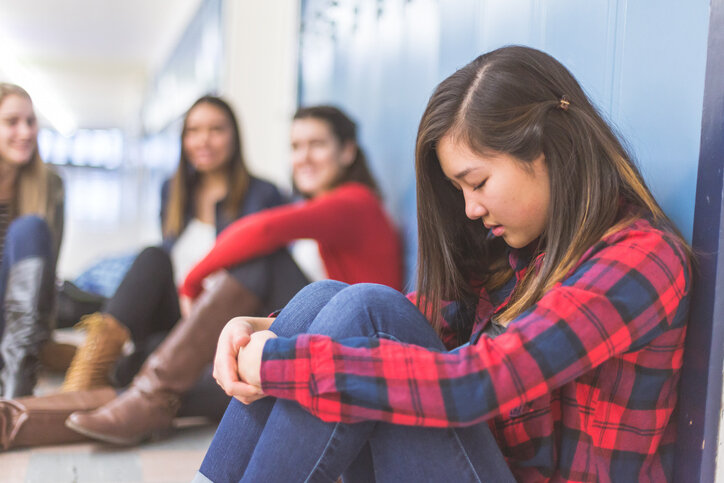What to do when Girls experience Bullying and Frenemies
In the the article “Helping Girls Cope with Bullying and Frenemies,” author Signe Whitson describes the passive aggressive world girls live in. She denotes that parents should be aware of their child’s emotions and how another girl can strongly affect them. Whitson describes simple lessons that parents should teach their child that will truly help her with her troubles with her friends. Girl friends are always nice to have, a good support system, a shoulder to cry on, someone who will lift you up and give you confidence, and make you laugh, but at the same time they could be a devil in disguise.
Whitson focuses on the common question: “What can adults do to help kids cope with inevitable experiences of friendship conflict and bullying?”
To Intervene or Not to Intervene?
It is very confusing when it is the right time to intervene. Parents have trouble deciding if they should protect their child from bullying and the pain that comes with a broken friendship or let them figure it out. Truthfully, no child should be left to deal with their pain alone especially when they lose a friendship. In the moment, calling off the friendship may have been the right decision because your child’s mental health and self-esteem can now improve, but your daughter just lost a person that was a piece of her life for so much time. This is when your child needs adult support and reassurance that everything will be okay. Bullying is a huge part of a girl’s life and most girls don’t know how to cope with it or even know that friendship should not be this hard.
Teach Her to Know it When it Happens
Bullying is known to fly “under-the-radar” in a sense that it is very hard to distinguish when it is happening. Many girls don’t know what they are experiencing it in their friendship until the pain, humiliation, and isolation gets into their heads. Even then, it is important that parents keep and open dialogue with their child and teach them typical behaviors that they need to look out for in a friendship...the warning signs.
When girls know what bullying looks and feels like, they are more educated to make a decision to move on from friendships that are making them feel bad when using these behaviors.
Whitson lists the common behaviors that bullies do that adults and kids need to be consciousness of:
Excluding girls from parties and play dates
Talking about parties and play dates in front of girls who are not invited
Mocking, teasing, and calling girls names
Giving girls the "silent treatment"
Threatening to take away friendship ("I won't be your friend anymore if...")
Encouraging others to "gang up" on a girl you are angry with
Spreading rumors and starting gossip about a girl
"Forgetting" to save a seat for a friend or leaving a girl out by "saving a seat" for someone else
Saying something mean and then following it with "just joking" to try to avoid blame
Using cell phones and/or social media to gossip, start rumors, say mean things, or forward embarrassing posts and photos
Help Your Daughter Cope with her Anger
Remember anger is a normal emotion to have. However, many girls are taught at a young age that anger is bad. They are pressured to be “good” all the time but that is a little difficult when their feelings get hurt. This is when your child needs to express how they feel no matter how hard it may be. Whitson provides an example of how a child should communicate her feelings: "Hey. I don't like the way you are treating me right now. I'm feeling angry about what you just said/did/pretended not to do, and I'm not going to let you treat me that way anymore.
Encourage Her to Show Strength
It is okay to feel sad, or hurt, or angry, but it is even better if girls know how to communicate what they are feeling whether that is to a close friend or a frenemy. However, when it comes to facing off with a frenemy, Whitson advices to parents ”teach young girls how to show resolute strength.” Teach your child how to be strong verbally in a sense that she knows how to control what comes out of her mouth and deflect a situation whenever their feelings are disrespected. As a parent, it is your job to be a cushion for your child where she can lean on you for support and express her emotions: a safe place to be vulnerable.
Teach Her to Know What She is Looking For
A friendship provides a sense of belonging where girls should be comfortable being themselves and opening up. If your daughter feels like she can’t do that then the friendship should be questioned. In order to feel accepted and embraced, a friendly, heart warming conversation with your daughter is never too bad to remind her about the values she should look for in a friendship. Whitson acknowledges that in any real friendship, both parties should:
Use kind words
Take turns and cooperates
Share
Uses words to tell each other how she feels
Help each other when needed
Compliments each other
Includes each other
Is always there for each other
Understands how each other feels
Care about each other’s opinions and feelings
Stand up for one another
Is fun to be with
Has a lot in common with each other
When girls understand their feelings and how they should communicate them, a beautiful and supportive friendship will result. With help from their parents, girls will learn all the skills needed to form a healthy friendship by knowing what a quality friendship looks like.
For more information on how Hilber Psychological Services can help you and your children to cope with their friendship conflicts and feelings, please contact us.
- Written by Lily Schmitt and Tanya L. Hilber, PsyD
References
Whitson, Signe. “Helping Girls Cope with Bullying and Frenemies.” Psychology Today. Web. 12, Jan. 2015. https://www.psychologytoday.com/ca/blog/passive-aggressive-diaries/201501/helping-girls-cope-bullying-and-frenemies

